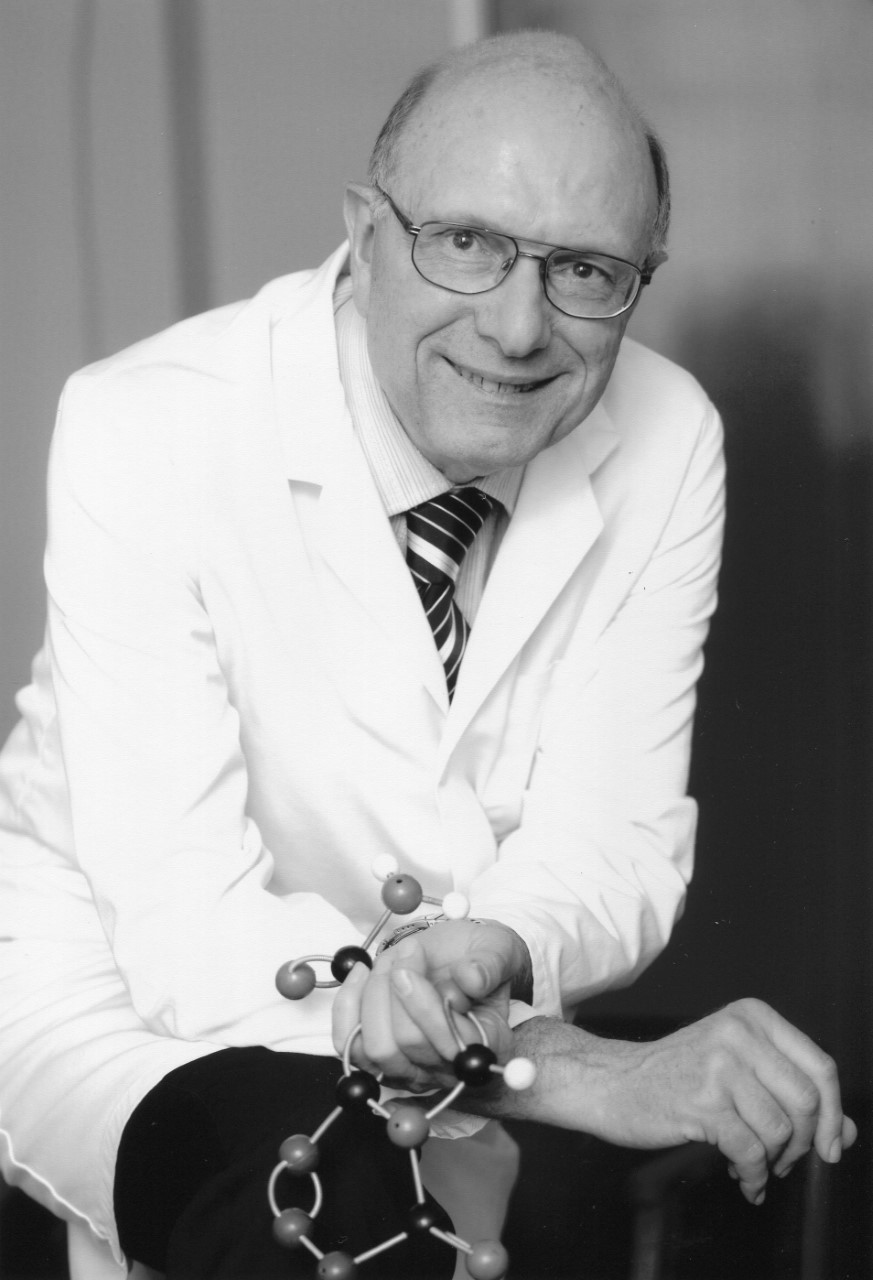Obituary for Emeritus Professor Dr Carl Schwalbe (2nd June 1942 to 1st August 2019)
Carl Schwalbe was an outstanding colleague. At his funeral at Halmer End Methodist Church Staffordshire there were glowing tributes from his sons and from his Aston University academic colleagues. It was clear from these tributes that Carl was a family man. We also learned of Carl’s love of classical music and how his wide ranging general knowledge put him in demand for quiz teams. The printed Order of Service remarked above the picture of Carl, reproduced here, “A man of science”, “A man of great integrity”. My wife Madeleine and I both attended. Carl’s former Head of Department of Pharmacy, Emeritus Professor Malcolm Stevens OBE FRS, included in his tribute to Carl of how on one occasion a young man was explaining in a seminar how he had dissolved his crystals in order to measure…..Before he could finish the sentence Carl firmly interrupted “You did what!?”.
The BCA President Professor Lee Brammer in his December 2017 Crystallography News Column wrote of Carl being admitted as an Honorary Life Member of the BCA as follows “Prof Carl Schwalbe is recognised not only for his research contributions in crystallography but as a longstanding contributor to the BCA, in particular in his role as editor of Crystallography News over the past decade and for his tireless activity in gathering information from so many sources.” I know that Carl was delighted about this Honour.
In preparing to write this obituary I read through all of Carl’s Editorials as Editor of Crystallography News, a role which he commenced in June 2008 and went through to June 2019. I selected just a few items that he shared with us in these about his personal history and also his learned insights as a pharmaceutical science crystallographer. First of all he wrote to introduce himself to the wide readership of Crystallography News “For those of you who don’t know me very well, here is a bit of background. I grew up in Ohio. Unsurprisingly since Ohio is just across Lake Erie from Ontario, some people think my accent is Canadian. I did my PhD research at Harvard with “Colonel” William Lipscomb during which I determined the structures of boron hydrides, those unusual cages where each boron atom seems to make unreasonably many bonds. We admired the Colonel’s genius as he made sense of the bonding and won the Nobel Prize in Chemistry. For my postdoctoral research I worked with Wolfram Saenger and Fritz Cramer at the Max Planck Institute for Experimental Medicine in Göttingen, Germany. There I developed my lifelong interest in pharmaceutical crystallography. In 1972 I looked for an academic position back in the U.S.A. but found little because of a round of budget-cutting. I decided to “park” in England for a few years until things got better and therefore took up a lectureship at Aston University. I have been at Aston ever since, receiving a Personal Chair in 2007 and going part-time during the current academic year. One thing that made me decide to stay here permanently is the cordial collaboration I developed with synthetic chemists at Aston, most notably Malcolm Stevens, whose anti-cancer drug temozolomide is approaching “blockbuster” status. Another important factor is the friendship and cooperation I have always received from British crystallographers.” In the March 2010 Crystallography News we also learned of Carl that “My grandfather and near namesake Carl Gustav Schwalbe founded the Institute of Cellulose Chemistry at the Technical University in Darmstadt.”
Carl wrote, quite simply, interesting and absorbing Crystallography News editorials. Some years he would attend the BCA, German Crystallographic Association, the ACA and the ECM conferences! So, Carl in his editorials shared with us, for example:- a recipe for the New Orleans’ dish Jambalaya in September 2011; the hot weather in Madrid on the occasion of the IUCr Congress where he had some relaxation attired in T shirt and shorts but the Pope, visiting Madrid at the same time, had of course to wear full Papal attire; and in the September 2012 Crystallography News Carl remarked how the new London Shard reminded him of a crystal of tourmaline and the pictures of each made the front cover of Crystallography News. In September 2008 Carl remarked “I am sorry to have missed the meeting of the Slovenian-Croatian Crystallographic Association, charmingly abbreviated “Slo-Cro”, in Ptuj, Slovenia. I would have loved to send my friends a postcard from Ptuj.”
The formal details of Carl’s impressive academic track record are as follows:- 2010-2019 Emeritus Research Fellow at the CCDC; 1972-2019 Lecturer, Senior Lecturer, Professor, Emeritus Professor in Medicinal Chemistry at Aston University; 1970-72 Research Fellow at the Max Planck Institute for Experimental Medicine (PI, Prof. W. Saenger); 1965-70 PhD, Harvard University (PI, Prof. William N. Lipscomb); 1959-64, Chemistry (summa cum laude) Oberlin College.
Carl’s depositions in the CCDC ranged from EAMBNO10 first published 1971 to XEZFIU, his most recent, published in 2018. His most cited article (D.Chattopadhyay, S.K.Chattopadhyay, P.R.Lowe, C.H.Schwalbe, S.K.Mazumder, A.Rana and S.Ghosh Journal of the Chemical Society, Dalton Transactions, 1993, 913-916, “Synthesis and Structural Studies of tetraaquacopper(II) diaquabis(malonato)cuprate (II)” with 72 citations) featured the crystal structure PECMIT. In Carl’s IUCr World Director of Crystallographers entry he listed his research interests as follows:- chemical crystallography, drug design, hydrogen bonding, molecular modelling, molecular recognition, drugs and MO calculations.
Carl was to have lectured at the IUCr Committee on Data Workshop at the ECM32 in Vienna. Instead Simon Coles and Suzanna Ward presented his latest work and ideas on the challenges of correct tautomer determination. This research was undertaken by Carl as a Cambridge Crystallographic Data Centre Honorary Fellow and which led to questions of how best to remediate those cases held in the CSD as described in his article Schwalbe, C. H. (2018). Crystallogr. Rev. 24, 217-235.
John R Helliwell
Emeritus Professor of Chemistry, University of Manchester.
